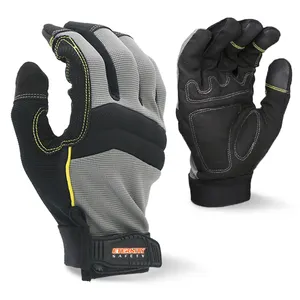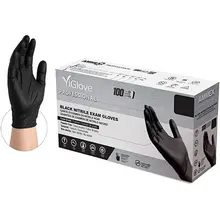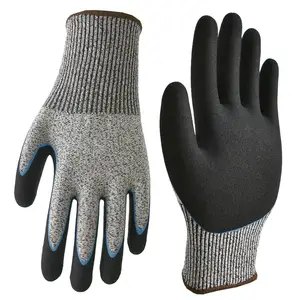Introduction
Mechanic gloves, often overlooked, are an indispensable tool for any mechanic or machinery maintenance worker. They serve as a protective barrier against the harsh realities of the job, including dirt, grease, and potential injuries. But these gloves are more than just a safety measure. They are designed with a variety of features and materials to enhance grip, improve dexterity, and boost work efficiency. This article delves into the world of mechanic gloves, exploring their types, materials, special features, and the crucial role they play in protection and work efficiency. It also provides guidance on how to choose the right pair to meet your specific needs.
The Unseen Necessity: Mechanic Gloves
Mechanic gloves are an essential tool for any mechanic. They provide protection against dirt, grease, and the general roughness that can be caused from handling car parts. These gloves are not just for mechanics, they can be used for any machinery maintenance including cars and construction. They come in a variety of designs and materials, tailored to specific needs. Mechanic gloves offer additional grip without reducing dexterity, perfect for handling tools amidst oil and lubricants. They also help keep oil off your hands, reducing the need for rigorous cleaning.
Types of Mechanic Gloves
Mechanic gloves are a safety glove that protects the hands and fingers from injuries. The two most popular types are nitrile rubber (or vinyl) and cotton canvas fabric with latex coating. Nitrile rubber is more durable than cotton but can be stiffer while working inside tight spaces. Cotton may stretch easier when you need to reach farther into small spaces. The best glove for a mechanic is the one that works best for them, often a balance between durability and flexibility. Most mechanics will have their preference, so it’s hard to say which type they prefer when all factors are considered equally.
Material and Durability
Mechanic gloves are typically made of durable materials like leather or synthetic substances such as neoprene. These materials are robust enough to withstand the wear and tear of heavy machinery, yet flexible enough to allow tactile sensitivity. Neoprene, in particular, is a popular choice due to its durability and heat insulation properties. It allows for free hand movement and extends the lifespan of the gloves, making them a cost-effective choice.
Fit and Comfort
The fit and comfort of mechanic gloves are crucial. Gloves that are too small can restrict movement and blood flow, while gloves that are too large can reduce finger dexterity. Workers will remove uncomfortable gloves, negating any protection. A glove with the right grip eliminates extra force or adjustments to body posture, reducing stress to muscles and joints. Gloves with customized finger configurations meet various needs, from full-fingered gloves for rough work to gloves with touch control for precision tasks. The four-way stretch in spandex provides a full range of movement for optimal dexterity.
Special Features
Mechanic gloves come with a variety of special features tailored to different needs. Dry Gloves are designed for use in dry environments, repelling oil and moisture. High Visibility Gloves are easily visible, perfect for roadside work. Thermal Gloves have an extra lining for working in colder environments. Cut Resistant Gloves are designed for working with sharp objects or parts, providing protection against potential cuts. Each type of glove is designed with a specific purpose in mind, ensuring that mechanics can find the perfect glove for their specific situation.
The Protective Role of Mechanic Gloves
Mechanic gloves play a crucial protective role. They provide a barrier against dirt, grease, and the general roughness that can be caused from handling car parts. These gloves also help reduce the irritation and pain that working with your hands for long periods can cause, reducing the chances of calluses forming or skin breaking. For real protection and security, hardened reusable gloves are the best option; only these gloves can make a real difference to your mechanical work. The additional grip and moisture resistance that mechanic gloves offer are the best way to deal with oily parts and tools safely and professionally.
Protection Against Physical Injuries
Mechanic gloves play a crucial role in protecting against physical injuries. They provide a shield against the roughness and irritation caused by handling car parts, reducing the chances of calluses forming or skin breaking. Certain types of gloves, like Cut Resistant Gloves, are specifically designed for working with sharp objects or parts, such as the metal components found under a car's hood. Whether you're dealing with sharp objects or simply the general roughness of mechanical work, these gloves offer the necessary protection.
Protection Against Chemicals and Contaminants
Mechanic gloves, particularly those made from nitrile, are an essential tool for protection against chemicals and contaminants. Their superior chemical resistance makes them ideal for handling hazardous materials in various industries. Manufactured from high-quality nitrile rubber, these gloves shield against a wide range of chemicals, solvents, oils, and other harmful substances. Whether you work in a laboratory, industrial setting, or automotive repair, mechanic gloves are a reliable tool to protect your hands from chemical exposure and potential harm.
Mechanic Gloves and Work Efficiency
A recent study assessed the efficiency of work gloves, focusing on hand grip strength, one-handed carrying, and leg lifting. The results highlighted the significant role gloves play in enhancing work efficiency. Specifically, mechanic gloves can improve grip strength, making tasks like one-handed carrying easier and more efficient. This suggests that mechanic gloves are not just protective gear but essential tools that can boost work performance and productivity.
Improved Grip
Mechanic gloves, particularly those with palm coatings, offer enhanced grip, a crucial feature for handling tools and small parts. The range of materials used for palm coatings, such as latex, polyurethane, PVC, and nitrile, contribute to this improved grip. For instance, polyurethane is known for its 'grippy' quality without being sticky, and nitrile can be foamed to behave like a sponge, improving grip on oily surfaces. These advancements in glove technology ensure that mechanics can work efficiently and safely, reducing the risk of slips and mishandling.
Reduced Fatigue
Ergonomically designed mechanic gloves can significantly reduce hand fatigue. These gloves are formed to the natural shape of the hand, enhancing a worker's movement and allowing the hands to bend and the fingers to flex more freely. This design not only maximizes worker protection but also increases productivity. For instance, in tasks requiring a secure grip on small, oily parts, the right gloves can prevent unnecessary exertion and stress on the muscles and joints, indirectly preventing injuries like carpal tunnel syndrome. Thus, mechanic gloves play a crucial role in reducing fatigue and promoting safe and efficient work practices.
Choosing the Right Mechanic Gloves for Your Needs
Choosing the right mechanic gloves involves considering several factors. Firstly, durability is crucial. Gloves that fall apart easily aren't worth the investment. Secondly, the gloves should allow full range of motion, a proper grip, and ideally be touch-screen friendly. Good elasticity and non-stiff material are beneficial. Lastly, comfort and fit are paramount. If the gloves don't fit well or the material isn't comfortable, you can't use your hands to their full potential. Remember, mechanic gloves are like a tool, and just like all tools, they’re supposed to make your shop life easier.
Conclusion
Mechanic gloves are more than just a protective layer; they are a tool that enhances work efficiency, reduces fatigue, and provides a safety shield against physical injuries and chemical contaminants. The right pair can make a significant difference in your work, whether you're a mechanic, a construction worker, or anyone who deals with machinery maintenance. The choice of gloves should be based on durability, flexibility, comfort, and fit, as well as the specific needs of your work environment. Remember, like any tool, the best mechanic gloves are the ones that make your job easier and safer. So, invest wisely and let your gloves be a helping hand in your mechanical work.































 浙公网安备 33010002000092号
浙公网安备 33010002000092号 浙B2-20120091-4
浙B2-20120091-4